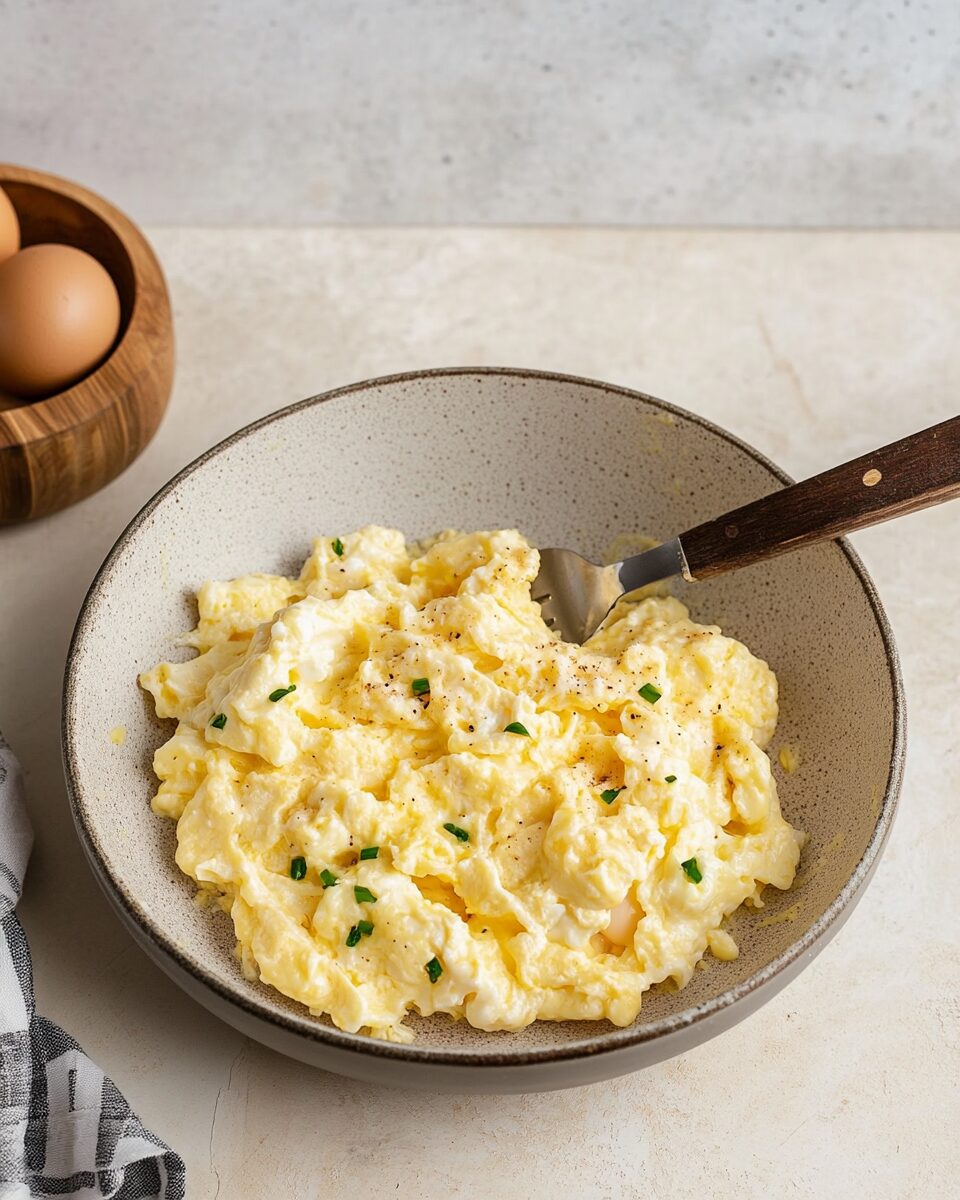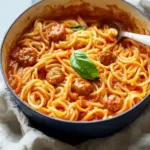The beauty of Anthony Bourdain’s scrambled eggs lies in their pure simplicity and dedication to patience. This recipe isn’t just about eggs—it’s about technique. Using low heat and a slow stir, the eggs develop into a soft, creamy custard-like dish that feels gourmet, even if you’re just in your pajamas at home.
Inspired by French technique and Bourdain’s unmistakable reverence for classic culinary basics, these scrambled eggs are an elevated take on a comfort food staple. The luxurious texture makes them perfect for a relaxed Sunday brunch or any morning you want to savor something special. Paired with crusty toast or fresh herbs, they are the kind of breakfast that deserves to be slowly enjoyed.
Full Recipe
Ingredients:
-
4 large eggs
-
2 tablespoons whole milk or cream
-
1 tablespoon unsalted butter
-
Salt, to taste
-
Freshly ground black pepper, to taste
-
Chives or fresh herbs (optional), finely chopped
Directions:
-
Crack the eggs into a bowl and whisk them gently with milk or cream. Do not overbeat; aim for a slightly streaky mix.
-
Heat a nonstick skillet over low heat and add butter. Let it melt slowly to coat the pan evenly.
-
Pour in the eggs and let them sit undisturbed for about 20 seconds until they just begin to set around the edges.
-
Using a silicone spatula, gently stir the eggs, scraping from the edges inward in slow, deliberate motions.
-
Continue cooking on low heat, stirring constantly to prevent overcooking. The eggs should slowly form soft curds.
-
Remove from heat just before they finish cooking. The residual heat will finish the job, resulting in a soft, custardy texture.
-
Season with salt and freshly ground pepper. Garnish with chives or fresh herbs if desired. Serve immediately with warm toast.
Prep Time: 3 minutes | Cooking Time: 5 minutes | Total Time: 8 minutes
Kcal: 210 kcal | Servings: 2 servings
A Tribute to Simplicity: Anthony Bourdain’s Scrambled Eggs
Anthony Bourdain, a name synonymous with culinary storytelling, global cuisine, and authentic food culture, had a deep appreciation for the simplest of dishes. Among those, scrambled eggs held a special place in his heart—not the rushed, rubbery kind often tossed on breakfast plates, but the slow-cooked, creamy, French-style eggs that turn a humble meal into a luxurious experience. His approach wasn’t about reinventing the wheel—it was about doing the basics exceptionally well. And that’s exactly what this dish represents: elegance through simplicity.
Why Bourdain’s Scrambled Eggs Are Different
At first glance, scrambled eggs might not seem remarkable. They’re often regarded as a quick weekday breakfast, whipped together in minutes. But Bourdain’s version stands in contrast to the fast-paced scramble. Instead of high heat and furious whisking, it’s all about patience. He believed in cooking them low and slow, using butter—not oil—to ensure a velvety, almost custard-like consistency. It’s an experience in mindful cooking, where attention to detail transforms a basic dish into something memorable.
These eggs aren’t just food—they’re texture, warmth, and comfort on a plate. The idea is to treat the eggs with respect, allowing them to gently coagulate and become creamy rather than dry. When done correctly, the result is something between a savory pudding and a softly set custard—rich, smooth, and incredibly satisfying.
The French Influence
Much of Bourdain’s culinary identity was shaped by his training at the Culinary Institute of America and his time in French kitchens. It’s no surprise that his scrambled eggs borrowed heavily from French techniques. The French method of preparing scrambled eggs—œufs brouillés—involves low heat, constant stirring, and, often, the addition of cream or milk to create a luxurious texture. Bourdain didn’t shy away from fat; he welcomed butter and cream with open arms, knowing that these ingredients were key to achieving the richness he sought.
This is a far cry from the dry, curdled eggs many people are used to. Instead, it’s about coaxing the eggs into a delicate, soft mass, maintaining their moisture, and treating them with reverence.
Texture Is Everything
One of the most striking aspects of Bourdain’s scrambled eggs is the texture. When made properly, they are soft and luscious—never rubbery or dry. This texture comes from careful heat control and constant motion. The eggs are stirred continuously to break up the curds and keep them creamy. Cooking them over low heat allows for better control and avoids the risk of overcooking.
The end result is closer to a sauce than a solid. This makes them an ideal topping for toast, croissants, or even spooned over sautéed greens. Their smooth consistency makes every bite melt in your mouth.
Simple Ingredients, Big Impact
One of the most beautiful aspects of this recipe is its minimalism. It uses only a few staple ingredients: eggs, butter, milk or cream, salt, and pepper. Yet, when combined with care, these simple components create something far more impactful than the sum of their parts. This approach speaks to Bourdain’s philosophy—highlighting the ingredients, not masking them.
This recipe reminds us that extraordinary meals don’t need to be complicated. What matters is the technique, the respect for ingredients, and the intention behind the preparation.
Perfect for Any Occasion
Although it’s a dish made from the humblest of ingredients, Bourdain’s scrambled eggs are anything but ordinary. They’re ideal for a quiet weekend brunch, a cozy breakfast in bed, or even a light dinner when you crave something comforting yet refined. Because of their rich texture, they can also be elevated with toppings like fresh herbs, crumbled feta, or smoked salmon for a more decadent twist.
These eggs are also incredibly versatile. You can serve them solo or alongside crusty bread, roasted tomatoes, sautéed mushrooms, or a small salad. They pair beautifully with a buttery croissant or a slice of sourdough toast.
The Emotional Side of Cooking
Food is never just food, especially for someone like Anthony Bourdain. Cooking was a connection to the world, a way to explore culture, and a form of self-expression. His scrambled eggs aren’t just about nourishment; they’re a reflection of care, attention, and emotional comfort. Making these eggs is a meditative process. The slow rhythm of stirring, the aroma of butter, and the transformation of eggs into a creamy delight offer a sensory experience that’s almost therapeutic.
In many ways, preparing these eggs can feel like a quiet rebellion against the fast-paced world—an invitation to slow down and enjoy the moment.
Tips for Perfecting Bourdain’s Scrambled Eggs
To get the most out of this dish, keep these tips in mind:
-
Use fresh eggs. The quality of eggs matters. Fresh, organic, or farm eggs will yield the best flavor and texture.
-
Keep the heat low. Patience is your best friend. Low heat ensures the eggs cook gently without turning rubbery.
-
Stir constantly. Use a silicone spatula and scrape the pan often to create soft, creamy curds.
-
Take them off the heat early. The eggs should still look slightly undercooked when you remove them from the heat—the residual warmth will finish them perfectly.
-
Season at the end. Salt can toughen eggs if added too early, so it’s best to season just before serving.
Health Benefits of Scrambled Eggs
While Bourdain’s version of scrambled eggs leans into richness, it still brings some health benefits to the table. Eggs are a powerhouse of nutrition. They’re packed with high-quality protein, essential vitamins like B12 and D, and healthy fats. When enjoyed in moderation, even butter and cream can be part of a balanced diet.
Moreover, eggs help support muscle repair, brain function, and satiety. For those following a low-carb or high-protein diet, this dish can be a satisfying and wholesome choice—especially when paired with fresh vegetables or whole-grain toast.
Why This Recipe Still Resonates
Years after Bourdain’s passing, his philosophy on food and travel continues to inspire millions. This egg recipe is just one example of how he taught the world to appreciate the basics, to find beauty in the humble, and to never underestimate the power of a simple, well-cooked meal.
Whether you’re a seasoned cook or just starting out in the kitchen, there’s something profoundly satisfying about mastering this dish. It teaches you patience, control, and the value of small details. More than that, it helps you reconnect with the joy of cooking—not for Instagram, not for likes, but for the sheer pleasure of it.
Conclusion
Anthony Bourdain’s scrambled eggs are a testament to culinary mindfulness. In an era where speed and convenience dominate, this recipe asks you to slow down. It’s not just about eating; it’s about cooking with intention and savoring every bite. With just a few ingredients, a little time, and a lot of love, you can transform breakfast into a deeply personal experience.
In the end, these eggs aren’t just food—they’re an expression of care. They remind us that great cooking isn’t about trends or flashy ingredients—it’s about making something ordinary feel extraordinary. That, perhaps, is the greatest lesson Bourdain left us with. So the next time you crack a few eggs into a bowl, consider taking the slow route. You might just find that it tastes a lot like peace.






